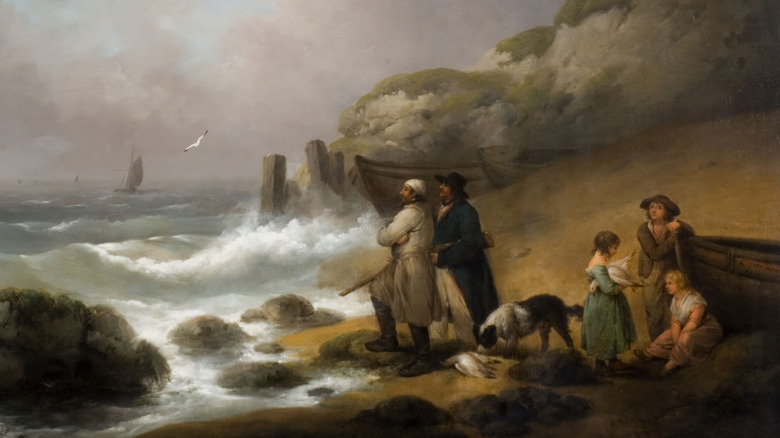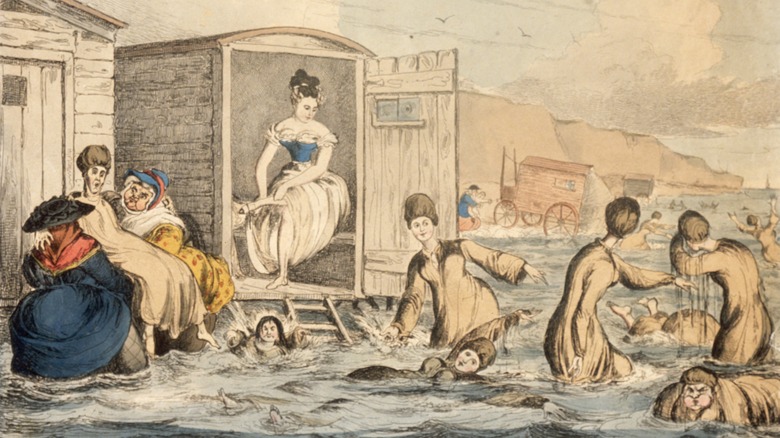Going To The Beach In The Regency Era Had A Different Meaning
Picture the beach. Maybe you think of a Caribbean paradise with white sands and green-blue waters. Your vision might carry shades of "MTV's Spring Break," Annette Funicello's beach movies, Ursula Andress, or any beachgoing experience that excited adolescent fantasies. Those from the British Isles might picture dramatic white cliffs over choppy waters. What you probably don't picture is a group of people from the end of the 18th century strolling the sand in full dress.
It was actually at the end of the Georgian era when the beach became a place for fun and relaxation. Before then, the British seaside was more likely to be shunned as a wilderness that consumed ships, threw up storms, and summoned monsters and pirates, according to the Smithsonian. But with the onset of the Industrial Revolution, the upper crust of British society began worrying about their health. The idea that ocean water could be an invigorating cure-all was proposed by Dr. Richard Russell and gained in popularity when the Prince of Wales, the future George IV, seized on it as a therapy during his regency (per The Telegraph).
Pleasure gradually replaced medication as a reason to hit the beach, and slowly, Britain influenced the rest of Europe to visit their own shores. But using seawater to cure everything from gout to depression, sometimes through drinking it, wasn't the only difference between a Regency day at the beach and a modern coastal vacation.
Bathing was approved for women ... with caveats
Regency Britons can't claim the invention of swimming itself. As John K. Walton wrote for History In Focus, the Romans and coast-based Catholics enjoyed a dip in the sea. But it was during the Georgian era that beachgoing became a pastime on a large enough scale to sustain business. Whitby, Yorkshire, and — appropriately enough — Bath became early hotspots for ocean bathing. Later on, George IV popularized Brighton during his regency (and transferred some of his rakish reputation onto the habit).
The beach grew in popularity among both sexes. Per Patrice Hannon's "101 Things You Don't Know About Jane Austen," there were only so many leisure activities open to women, particularly unmarried women, and sea-bathing was one of them. Among its enthusiasts was the author Jane Austen, who enjoyed swimming at the resort in Lyme Regis. She sometimes enjoyed it to excess, as she confessed in a letter to her sister in 1804 (via the Jane Austen Literacy Foundation).
Like other women, Austen was subject to the standards of modesty and decency of the time, which couldn't bear to have women seen in public in certain states of undress. The solution was the bathing machine — or a "cabana on wheels," as Hannon described it. After changing inside the machine, which was backed up to the water line, women would plunge in with the help of attendants known as dippers. Men could have a similar arrangement, though their attendants were called bathers.
The winter was peak beach season
For many of us, one of the chief appeals of the beach is the warmth. We might plunge into ocean water to beat the heat, but a certain amount of hot air is welcome once you're out of the water. After all, who wants to come up soaking wet to face the icy sting of a cold breeze?
It seems Regency Britons did, or at least were advised by their doctors to do so. Per the Smithsonian, the wealthy who turned to the sea as medicine weren't just concerned about common ailments. Among other stark societal divides made bare by the Industrial Revolution, the aristocracy began perceiving the working class as robust and empowered by their labors. A cold plunge into the ocean was meant to invigorate the rich. Notably, Jane Austen's relatives were told that February was when the sea was most beneficial. Besides its bracing effect, the cold was also thought to be safer for swimming, as one's pores would be closed, according to Maggie Lane's "Jane Austen's World: The Life and Times of England's Most Popular Author."
Not everyone heeded that advice or found winter a great time to swim. Per Lane, Austen herself preferred the warmer months, and the beach's appeal shift from restorative tonic to entertainment can't have helped the case for winter. Greater ease of transportation also made the beach accessible to the lower classes, cutting in on the aristocracy's aim of reinvigorating themselves.


